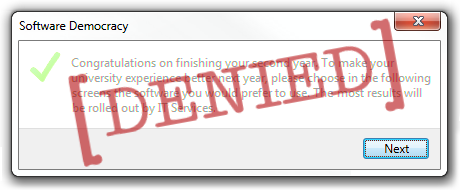Should universities become open source tech democracies?

Zack Whittaker is in New York City.
Democracy is a strange concept in today's society, as something nations, states and ideologies will invade to promote the idea. Within the typical university environment, you will find a hotbed of student radicalisation and empowerment by which often means the promoting of one's beliefs and opinions onto others.
With universities all over the world suffering still from economic hardship after the deep cutting global financial crisis, open source technology and outsourcing services have been a major playing field for those in the education industry; cutting down costs to cheaper alternatives is vital in restoring the balance books.

But when the two come together, often they don't see eye to eye. My thought is this. Seeing as students pay their way through college and the higher education system, why not give us a say in their IT surroundings and allow us the decision to decide what technologies, products and services to use?
Many applications are niche and practically irreplaceable: SPSS for statistical analysis, used highly in psychology and mathematics, and AutoCAD for another example, used to render 3D drawings and the like. These are almost bog-standard in any university library public PC.
But for those finishing their first, second and anywhere up to and including their penultimate year of study, students should be given the chance to vote on the software they use.
The best example is the good old Google Apps for Education vs. Microsoft Live@edu outsourced email and collaboration suites. They both rival each other and Microsoft is winning the competition. But it would be an unprecedented move to actually consult and ask the students directly which they would prefer. Pilots have been successful and unsuccessful and based vastly on student opinion, but the final say-so rests with those with the chequebooks.
Though the infrastructure would logically need to be addressed by those who were qualified to understand such complex workings, but the software available to use as customisable to the person in hand is crucial to opening the desktop application market to the more marginalised programs. Open source programs and services could be allowed to flourish, though it could lead to the more typical suite of applications reigning through sheer student ignorance.
My question is simple. Why not?